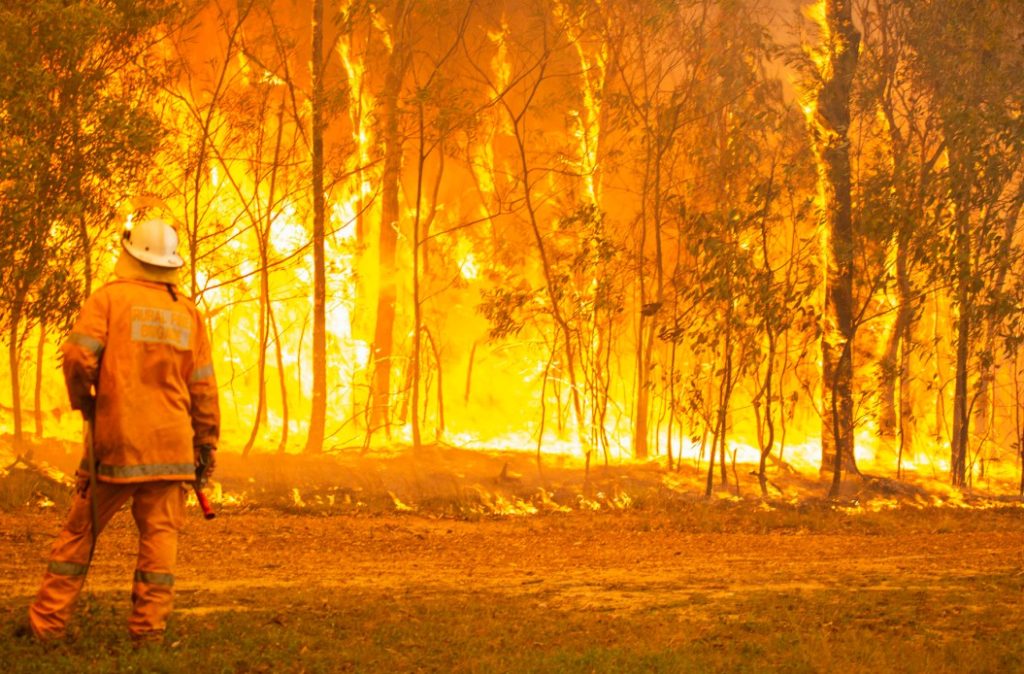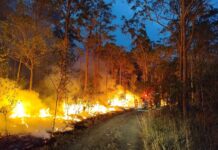
An independent review of the 2018 Deepwater fire has found there was “significant tension” between emergency services and residents over mandatory evacuations.
The Inspector-General Emergency Management bushfire review also reveals that some residents initially refused to leave their homes when contacted by authorities.
“Their details were recorded so that further attempts could be made. Some residences were doorknocked up to five times over the days that followed,” the report says.
“This put the agencies undertaking doorknocking at repeated unnecessary risk and used valuable resources which could have been put to use elsewhere.”
The bushfire review notes there was confusion over different warnings that were issued in a short space of time.
“There was some perception by community members that a downgrading in the level of warning meant that the situation was no longer dangerous,” the report says.
“In response to this misunderstanding, QPS developed supporting messaging in collaboration with QFES.
“This provided the community with more information and reiterated the message that individuals were required to remain evacuated if they had already done so, as it was not yet safe to return.
“There is an opportunity to further develop this concept and provide greater clarity around downgraded messaging for future events.”
The Office of the Inspection General heard that emergency services continued to doorknock residents who had refused to leave.
“The Office’s community survey indicated a significant portion of the Deepwater community members surveyed (79 per cent) did not evacuate when directed,” the report says.
“The Office heard multiple reports in both individual submissions and during debriefs of individuals hiding in their homes and in bushland surrounding their properties to avoid being ordered to evacuate.
“Several individuals were reportedly removed from their properties under police authority.
“Some individuals from the community reported feeling traumatised due to the perception that they had been unreasonably forced from their homes.
“The reports indicate a lack of understanding about directed evacuations, and what these mean for individuals.
“The point that is perhaps lost, is that such direction is for their own welfare, and that remaining puts others in danger.
“Responding firefighters have one less concern if people are not at properties that they are protecting.
“QPS have a duty to ensure the safety of the community. The direction to evacuate is given if it is deemed necessary for the preservation of human life. There is an opportunity for further public engagement on this topic.”
The Inspector General recommended that communications protocols about hazard-specific events should be developed to clarify responsibilities and the principles for the release of information and warnings. They should be included in all related hazard-specific plans and published on relevant websites and used during events.
The report says there remains “a significant level of confusion and differing expectations expressed across state agencies and local governments, about allocated roles and responsibilities in providing bushfire warnings to local communities when an incident escalates to an event causing major disruption across the community”.
Bushfire review heard permits difficult to obtain
Regarding planned mitigation burns, the Office heard from landholders that it’s difficult to navigate the process of obtaining and executing permits to light fires.
The bushfire review found that some landholders see legislation and “permit to light” regulations that guide mitigation activities as complex, and a barrier to effective bushfire mitigation.
“A single source of information, along the lines of the Department of Natural Resources, Mines and Energy’s ‘Veg Hub’, about mitigation activities, regulations, exemptions and approval processes would make navigating the system more accessible and efficient for landholders,” the report says.
To make planned burning and land clearing easier to understand and implement for landholders, the review recommends a single point of contact for all bushfire mitigation inquiries and permits should be established.
Another recommendation: Given an increasing risk of intense fires, the framework of legislation relating to vegetation management, bushfire mitigation and hazard reduction, together with mitigation and preparation priorities should be re-assessed. The re-assessment should aim to enable more appropriate and flexible means at the local level for the reduction of intense fires.”
The Government has accepted all the recommendations in full or in principle.
- Landowners urged to make bushfire preparations







